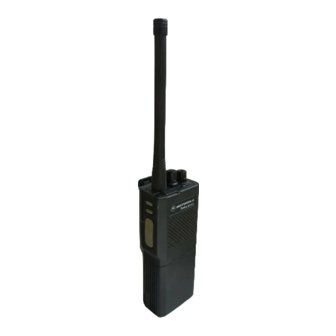- ページ 5
ポータブルラジオ Motorola RADIUS GP300のPDF 取扱説明書をオンラインで閲覧またはダウンロードできます。Motorola RADIUS GP300 47 ページ。 Portable radios
Motorola RADIUS GP300 にも: マニュアル (15 ページ)

Certain combinations of chemical environments
can adversely affect thermoplastic resins, the
material the housing of the radio is made from.
For this reason, lubricants, cleaning agents,
solvents or any other material which may come
in contact with the housing of the radio should
be carefully evaluated for compatibility. We rec-
ommend a mild dishwashing soap for cleaning
the exterior of the product.
Recycling or Disposal of Batteries
This portable radio is powered by a nickel-cadmium (Ni-Cad) recharge-
able battery. At the end of its useful life, the battery can be recycled.
However, recycling facilities may not be available in all areas. Under
various state or local laws, the battery must be recycled or disposed of
properly and cannot be disposed of in landfills or incinerators.
In addition, U.S. Environmental Protection Agency (EPA) regulations
classify used Ni-Cad batteries as hazardous waste, unless certain
exemptions apply.
Motorola fully endorses and encourages the recycling of Ni-Cad batter-
ies. If you are located in the United States, you can ship post paid your
used Ni-Cad batteries to INMETCO, an EPA approved recycling facility,
at this address:
INMETCO
P.O. Box 720
245 Portersville Road
Ellwood City, PA 16117
Telephone: (412) 758-5515
Fax: (412) 758-9311
Consideration should be given to the methods of collecting, labeling,
and shipping used Ni-Cad batteries. Your federal, state or locate EPA
should be consulted for specific legal requirements and for recycling
options in your area.
Motorola, as a responsible corporate citizen, has always been con-
cerned with the protection of the environment. Please feel free to call
the phone number 1-800-422-4210 for further information.
WARNING
